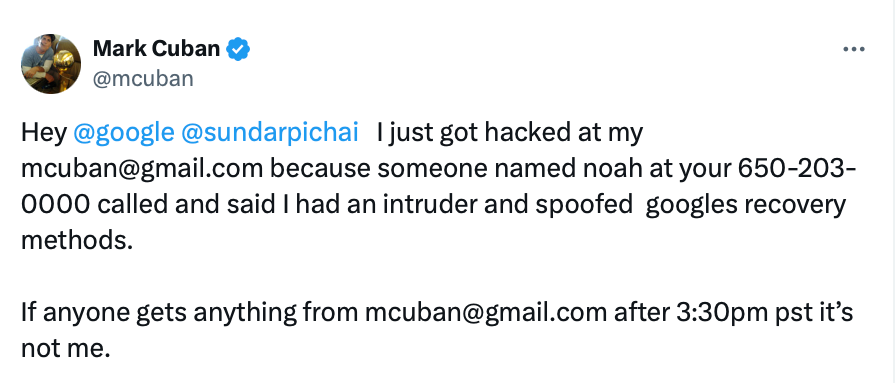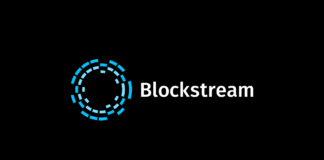Billionaire investor and Shark Tank judge Mark Cuban recently found himself embroiled in a concerning cybersecurity incident, as his Gmail account compromised following a phishing scam call from a person claiming to be a Google representative. This Mark Cuban email hack marks the second major cybersecurity threats Cuban has faced in less than a year, raising questions about the cybersecurity risks for high-profile individuals in the digital age.
The Anatomy of the Gmail Hack
According to Cuban’s now-deleted tweet, he received a phone scam call from someone named “Noah” using Google’s official phone number, 650-203-0000. The caller claimed that someone had gained unauthorized access to Cuban’s Gmail account and was attempting to spoof Google’s recovery methods. Alarmed by this information, Cuban promptly informed his 8.8 million social media accounts followers that any emails sent from his “[email protected]” address after 3:30 PM PST on the day of the incident were not legitimate and should be disregarded.

Speculation and Reactions from the Community
The deletion of Cuban’s original tweet has sparked a flurry of speculation among social media users, with some suggesting that the billionaire’s Twitter account may have also been compromised in this email hack. Others have offered their own theories, speculating that the hackers might have used phishing tactics like a spoofed SIM card to mimic the Google phone number and lure Cuban into revealing sensitive information through social engineering.
The crypto industry community, in particular, has been closely following this incident, with Kraken’s Chief Security Officer, Nick Percoco, jokingly requesting that the blockchain enthusiast Cuban screenshot his unread emails after regaining access to his account. This request highlights the potential scale of the damage, as Cuban’s high-profile status likely results in a constant influx of messages.
Cuban’s Crypto Wallet Hack: A Concerning Precedent
This latest Gmail security breach comes just nine months after Cuban suffered a Mark Cuban crypto hack where his cryptocurrency wallet was drained of approximately $870,000, in a separate incident that raised concerns about the crypto wallet security measures employed by the billionaire. In that case, independent blockchain sleuth Wazz was the first to detect the suspicious activity, noting that Cuban’s wallet had been dormant for several months before the attack.
Cuban later confirmed the crypto losses from his wallet hack, revealing that he had downloaded a corrupted version of the MetaMask wallet, which had allowed the attackers to gain access to his funds. This incident further underscored the importance of robust crypto investment security practices, even for high-profile individuals navigating the rapidly evolving world of digital wallets and crypto services like Binance, Coinbase, Uniswap and Tether.
Cuban’s Advocacy for Crypto Regulation
Interestingly, Cuban has been a vocal proponent of more favorable cryptocurrency regulation in the United States, particularly in his criticism of the U.S. SEC and its approach to the industry under chair Gary Gensler. In May 2024, he expressed his preference for the Commodity Futures Trading Commission (CFTC) to handle all crypto regulatory news, arguing that the SEC had failed to protect crypto investors from fraud.
Cuban’s advocacy for regulatory reform in the crypto space can be seen as a direct response to the challenges he and other industry participants have faced, including the recent hacking incidents targeting his personal accounts. As a prominent figure in both the traditional investment world and the crypto ecosystem, Cuban’s perspective carries significant weight and could potentially influence the ongoing policy debates.
The Broader Implications of the Gmail Hack
The Mark Cuban phishing scam targeting his Gmail is not an isolated incident, but rather a reflection of the broader email security challenges facing individuals and organizations in the digital age. High-profile figures, particularly those with significant online presence and influence, are often targeted by malicious actors seeking to exploit vulnerabilities and gain unauthorized access to sensitive information.
These types of phishing attack can have far-reaching consequences, not only for the individuals directly affected but also for their broader networks and the public’s trust in digital systems. As the reliance on digital communication and online platforms continues to grow, the need for robust security measures and heightened awareness of potential threats becomes increasingly critical to prevent financial loss.
Conclusion
The recent Gmail phishing scam targeting Mark Cuban is a stark reminder of the vulnerabilities that even the most influential individuals face in the digital age. As the billionaire investor grapples with the aftermath of this incident, it serves as a cautionary tale for others who may find themselves in the crosshairs of cybercriminals.
Disclaimer: The information provided in this article is for informational purposes only and does not constitute financial advice. Investing in cryptocurrencies involves risks, and readers should conduct their own research and consult with financial advisors before making investment decisions. Hash Herald is not responsible for any profits or losses in the process.













